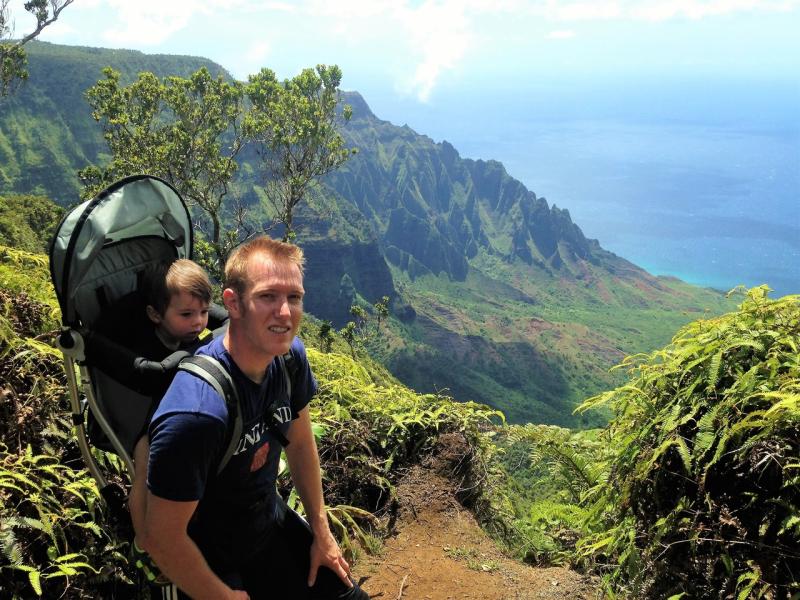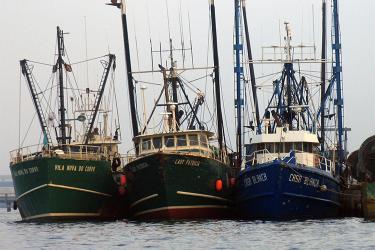We continue our series to introduce the people who work at the Northeast Fisheries Science Center. Each month we feature a new "face" from the Center's five laboratories. We share with you a bit about who they are, what they do at the Center, and what they enjoy doing in their spare time. Glenn Chamberlain from our Fisheries Sampling Branch wears many hats but works primarily on projects associated with the herring, lobster, and squid fisheries in the Northeast.
Where did you grow up?
I grew up in Canton, Massachusetts, a small suburb of Boston. I spent a lot of time outside in the woods with my two brothers and sister and a pack of neighborhood kids. We would catch bugs and salamanders, play tackle football, ride bikes, make forts, and explore swamps and trails in a nearby conservation area. I was always interested in learning more about the plants and animals I encountered through reading magazines, books, and watching nature documentaries.
Each summer, my family would spend a couple weeks on Cape Cod. It was the highlight of my year. I was free to spend all day chasing minnows, sunfish, and perch at a local pond and collecting sea life during low tide at the beach. We also visited my great aunt and uncle in coastal Maine twice a year. There, I spent time watching lobstermen hauling their traps and many hours exploring the coastline, skipping rocks, and searching for sea glass. When I graduated from high school, these childhood experiences influenced my decision to pursue a career in the natural sciences.
Where did you go to school and what did you get your degree(s) in?
I received a bachelor’s degree in marine science from the University of Maine Orono. While at UMaine, I took a number of fisheries electives and had an excellent undergraduate adviser who specialized in marine fisheries. As a result, I decided to concentrate on a career in fisheries science.
I received a master’s degree in marine science and technology from the University of Massachusetts Dartmouth. My degree at UMass focused on the development of a prototype system that could collect images of catches onboard groundfish vessels using digital single-lens reflex cameras. I worked with the captains of two groundfish vessels to collect images and refine the system. The insight and experience of the captains and their crew was invaluable to completing my research. I also spent many frigid hours inside the fish cooler of a New Bedford fish processing plant. I worked to calibrate the system before deploying it on a vessel. The images I collected were analyzed to produce estimates of the volume and weight of the catch using concepts of photogrammetry. My adviser and I went on to obtain a patent for the concept once I finished my degree.
How did you come to work at the Northeast Fisheries Science Center?
After graduating from UMaine, I lined up a seasonal position as a lab technician on a research cruise, collecting and processing samples from the ship’s CTD. I departed from Alaska on the R/V Thomas G. Thompson, operated by the University of Washington. At this point I knew I wanted to go on to graduate school, but I also wanted to spend some time in the field before going back to school. I received an offer from an observer provider for the center’s Northeast Fisheries Observer Program and enrolled in the fall observer training.
My time as an observer included a year of full-time work and another year of part-time work. I enjoyed the time on the water, the chance to see new species, the conversations I had with fishermen. I also loved watching the sunrises and sunsets at sea and the constantly changing ocean landscape. Observing confirmed my intention to continue a career in fisheries, and I went on to graduate school.
After completing my graduate degree, I accepted a position at the center’s Fisheries Sampling Branch. I worked on a pilot project to test the applicability of electronic monitoring to the groundfish fleet. I worked on the pilot project from its start in 2010 through its conclusion in 2014. During that time, I was responsible for a number of tasks, including communication with project participants, equipment installations, hardware and software troubleshooting. I also conducted, data review, data auditing, data storage, project management, and database design.
What do you do at the Science Center?
I am the Northeast area lead assistant in the Fisheries Sampling Branch. My position has grown since joining the branch ten-plus years ago. It affords me the opportunity to engage in a number of different projects and tasks. They range from writing funding proposals to spending time at the docks catching up with vessel owners and captains. I help administer programs for fishery-dependent data collection (data that is collected at-sea or at the dock). I support our observers, at-sea monitors, and portside samplers in the field as they deploy on vessels from Maine to North Carolina.
My job duties are primarily associated with the herring, lobster, and squid fisheries. I work closely with colleagues at the science center, the Greater Atlantic Regional Fisheries Office, and at the fishery management councils. I support in-season quota management, analyses, management actions, and policies. Recently, my role has expanded into project management in preparation for a new industry-funded monitoring program in the Atlantic herring fishery. Our branch is developing training materials and safety protocols, a tablet-based application to collect portside sampling data, a new database, and an expanded notification system for the herring fleet. We’re also planning communications with stakeholders.
I also lead projects to upgrade herring offload locations to bring them up to our safety standards for the center’s portside samplers. This project is challenging but rewarding, requiring collaboration between NOAA Fisheries staff, vessel and processing plant owners, and state fisheries agencies in Massachusetts and Maine. I also manage a project with center and regional office colleagues to characterize and reduce bycatch in the herring fishery. We deploy electronic monitoring systems and modern echosounders on herring vessels. I am optimistic that the results will positively impact the fishery going forward!
What do you like most about your position?
I like that every day is different, that there are always new challenges and ideas to explore and that there is room to innovate and grow professionally. The Fisheries Sampling Branch is often required to provide data to meet new and evolving needs, and I have been encouraged to learn and develop new skills and tools to meet these needs. I also value the relationships I have developed, including those with observers, the fishing industry, NEFSC and GARFO staff, observer/electronic monitoring service providers, and council staff. I enjoy being involved with the local American Fisheries Society (AFS) chapter and the professional development opportunities it offers. Involvement with AFS has broadened my knowledge base, provided the chance to develop leadership skills, and introduced me to a number of professional contacts in the Northeast.
What are some of your hobbies?
My wife, Mari, and I have two boys ages 5 and 3. My hobbies mostly include activities we can do as a family. We enjoy exploring nature trails, visiting local Cape Cod ponds and beaches, traveling, hosting cookouts, and tending our vegetable garden. I also run a small oyster farm, which I hope my children will assist me in managing one day. As my kids grow, I look forward to getting more involved in youth sports, 4-H, and other activities.





